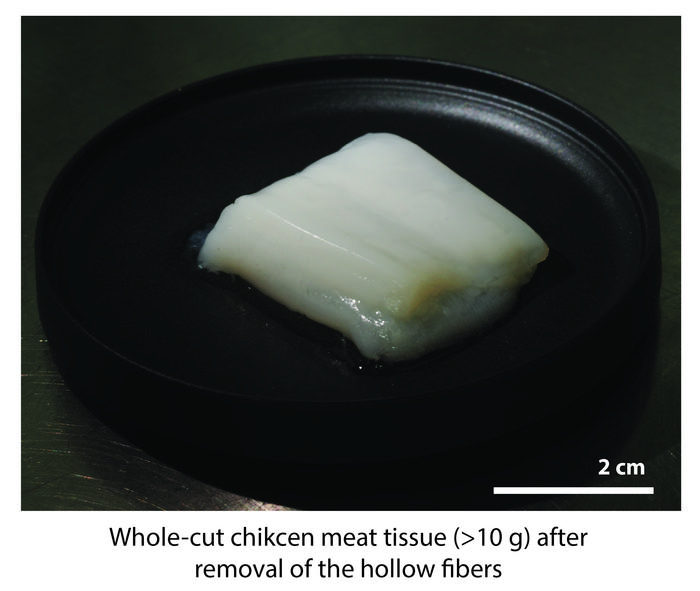Scientists have created nugget-sized bits of chicken meat in a bioreactor that can mimic the blood vessels to deliver nutrients and oxygen to the artificial tissue. It might bring the concept of “processed foods” to a whole other level, but the researchers suggest their technology offers a “sustainable, ethical alternative to conventional meat.”
Creating lifelike tissues in a lab is not easy, especially when it comes to making sure all the cells get enough nutrients and oxygen. There are ways around this, but most current methods can’t deliver this evenly on a large scale.
To solve this, researchers at the University of Tokyo developed a new tool called a perfusable hollow fiber bioreactor. The system uses tiny, tube-like fibers that act like artificial blood vessels, distributing nutrients and oxygen throughout the entire tissue. These fibers do not just keep cells alive, but they also help guide cell growth in the right direction, thanks to “micro-anchors” that hold it all in place.
When used to grow chicken muscle in the lab, this technique led to stronger muscle structures and (apparently) improved both texture and taste, making it ideal for realistic cultured meat.
To speed things up and make the process scalable, a robotic system is designed to help place these fiber networks. This, the researchers say, could eventually lead to a full automation of this approach in the near future.
“Our study presents a scalable, top-down strategy for producing whole-cut cultured meat using a perfusable hollow fiber bioreactor. This system enables cell distribution, alignment, contractility, and improved food-related properties,” Shoji Takeuchi, senior author from the University of Tokyo, said in a statement.

I’ll take the robot-grown chunk of cultivated chicken flesh, please. (PS. the spelling mistake wasn’t us).
Image credit: Shoji Takeuchi / The University of Tokyo
“Cultured meat offers a sustainable, ethical alternative to conventional meat. However, replicating the texture and taste of whole-cut meat remains difficult. Our technology enables the production of structured meat with improved texture and flavor, potentially accelerating its commercial viability,” Takeuchi added.
It might be a challenge winning over customers, though. A poll in 2024 found that 33 percent of people in the US were not willing to even try cultivated chicken, suggesting many consumers have a strong distrust of the unknown when it comes to food.
Even beyond taste and people’s sense of ickiness, there are environmental concerns around lab-grown meat. Some research has suggested that large-scale cultivated meat production could release between four and 25 times more greenhouse gas emissions than the global beef industry.
Nevertheless, lab-grown chicken strips are just one possible application of this newly developed technology. Theoretically, the system could be used for scientific applications, like 3D-printed organs and soft robotics.
The new study is published in the journal Trends in Biotechnology.
Source Link: Lab-Grown Chicken Nuggets Have Been Cooked Up In A Robotic Bioreactor